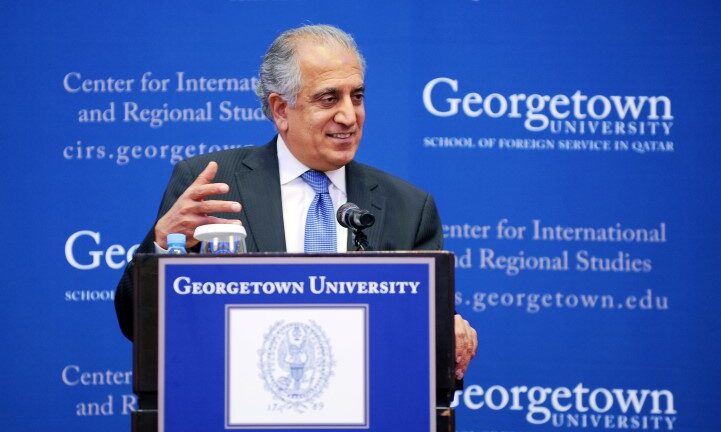Dialogue Series, Regional Studies
Zalmay Khalilzad on America and the Middle East: Future Challenges and Opportunities

Zalmay Khalilzad was invited to deliver a CIRS Distinguished Lecture on the topic, “America and the Middle East: Future Challenges and Opportunities” on December 13, 2010, in Doha, Qatar. Khalilzad served as U.S. Permanent Representative to the United Nations (2007-2009), U.S. Ambassador to Iraq (2005-2007), and U.S. Ambassador to Afghanistan (2003-2005).
The Ambassador spoke about the relationship between the United States and the Middle East within two different contexts. The first, he said, “is the framework of thinking about the Middle East after 9/11, which was a decisive moment in American history in terms of its approach to this part of the world” and the second is the “transition to a new approach, which I think is in formation.” The word “transition,” he said, “implies continuity and change” of current policies as the United States adjusts to shifts in the global order.
Khalilzad defined the broader Middle East as stretching from Pakistan in the east to Morocco in the west and argued that in order to understand the relationship between the United States and the Middle East, it was first necessary to begin with observations regarding the impact of the events of September 11, 2001. Although the Ambassador pointed out that America is a heterogeneous country that is made up of a multitude of ideologies and schools of thought, he noted that “9/11 had a big impact on American thinking – on official American thinking.”
One significant change, Khalilzad argued, was that “9/11 made the United States think of this broad region geopolitically,” and as having real and lasting impacts on national and international security. The challenges of this region, he said, have the ability to reverberate around the world. In today’s integrated world, regional problems have great consequences for the entire international community. “In the post 9/11 environment,” Khalilzad said, “working towards a region that would be more at peace with itself and with the world became a strong tendency orientation in the U.S. foreign policy debate discussion and doctrines.”
It was within this framework that Khalilzad said the United States ventured into Iraq. “I believe Iraq, although it still remains in a difficult transition, is in an improved situation than it was at times in its recent past.” This is because the United States worked to “encourage a process of democratization and a belief that democratization through elections and support of civil society organizations was going to lead to a decrease in the unhappiness of the people” which produces extremism, he argued.
Other issues that impact the stability of the Middle East region’s development, the Ambassador said, is the ongoing Israeli-Palestinian conflict; the problems in Afghanistan that transpired to be far more complex than the United States originally thought; and the lingering threat of Iran.
Taking all of these regional conflicts into account, Khalilzad spoke of how the United States has modified its approach to the Middle East. He argued that the Iraqi challenge is currently less than it was in the past, but the challenge of Iran and Afghanistan are becoming increasingly prominent. The challenge of terrorism and extremism has lessened in some areas, but, he warned, has spread and became stronger in other parts of the world. Other than these issues, East Asia has become an area of increasing geopolitical importance with the rise of China and India, and the challenges imposed by North Korea. The Ambassador said that “as a result of the shifts in the geopolitical issues in the world, there is going to be a greater focus on the issues of East Asia both in terms of diplomacy and in terms of military strategy for the longer term to adjust to the balance of power changes that are taking place.”
Looking to which issues will become important in the future, Khalilzad argued that “although political challenges remain, it is the future of the economy – particularly the US economy – that has gained in relative importance.” He continued by saying that “the U.S. position in the world ultimately rests on its economic and military power, and its military power cannot be sustained without its economic power being such to be able to afford the kind of capabilities that its global role so far has required.”
Concluding the lecture, the Ambassador said that these political and economic problems will necessarily result in adjustments in future U.S. policy. These adjustments will include “a greater emphasis on stability in order not to produce more demands on resources and effort on the part of the United States,” he said.
Article by Suzi Mirgani, CIRS Publications Coordinator